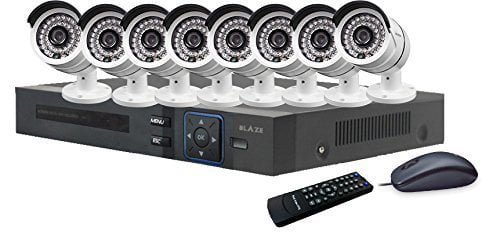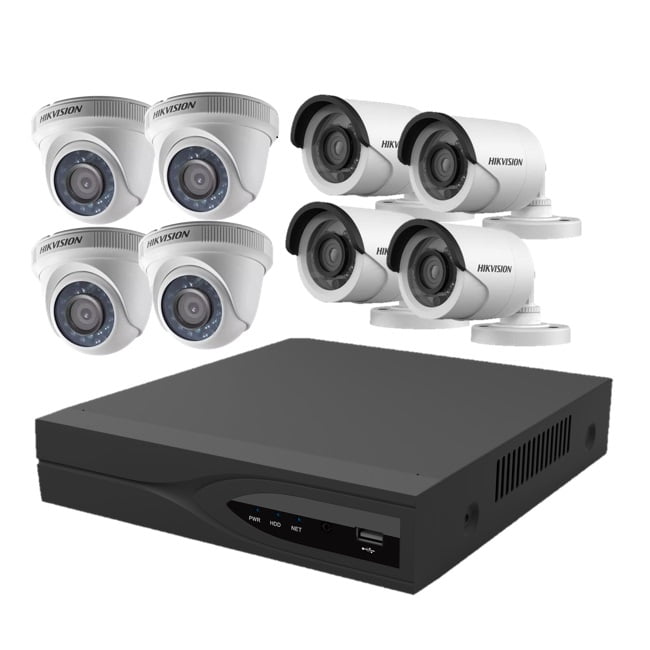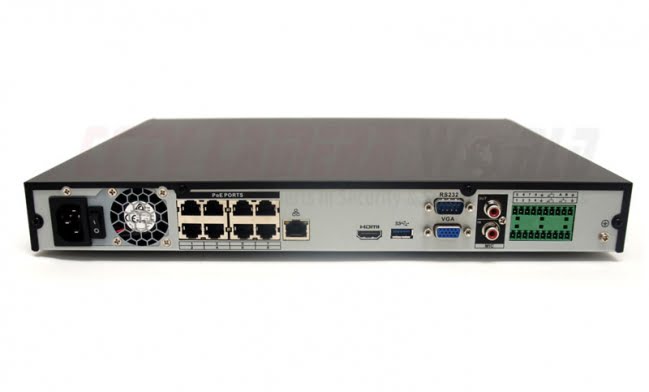Today we are going to talk about what are the differences between NVR DVRs and Hybrid DVRs and what are the advantages of using one over another. Security cameras or video surveillance have different technologies to record everything that happens in front of the lens, beyond the qualities such as image quality as megapixels, optical sensors, and processors. But we will talk about different aspects of them.
DVR vs NVR: Which one is better?
Digital Video Recorder is a video recorder in digital format, which means that records the video signal in a digital medium which can be manipulated by software later. The most usual is to find that a DVR requires one or more hard drives such as USB memory or micro SD memory to store the information. Here the important point is that a DVR is still “analog” because it records the video digitally. The video is transmitted to the device through a coaxial cable where we have a bandwidth limitation.
An NVR is the evolution of the DVR, NVR means Network Video Recorder and the network section is because unlike the DVR in the case of NVR recording will come through the network and you can do many things through the network.

The advantages of using DVRs
The main advantage of acquiring a DVR system is the cost of both the device and the components. Nowadays recognized brands such as Dahua or Hikvision can offer you DVR solutions for really cheap costs apart from the fact that they are plug-and-play since, as I mentioned before, a coaxial cable is used for its connection, which is already built. In the market, you can find DVR kits starting from $150. You can install it yourself in your home or office and you can connect it to the internet and view the cameras online.
Another advantage of buying a DVR is that it can be easily modified by buying new cameras later.
The advantages of using NVRs
The NVR is a more complex system than the DVR although in principle they fulfill the same function, the NVR is a microcomputer with a decent processor that will be in charge of encoding and processing the image received through the network. The main difference between DVR and NVR is that the latter is connected via a network cable, you can not use a coaxial cable for connection, in the same network cable you can send the power (POE protocol) and the video signal.
The main advantage of an NVR is that you can place cameras at longer distances without the need to connect directly to the device because the only requirement is that they are connected to the same network.
Another advantage of an NVR is that you depend more on the processing capacity than on the port capacity. For example, you can buy an NVR that only has 4 ports (for 4 directly connected cameras) but it has enough processor power to record another 8 cameras that it can detect through the network. This is unlike the DVR where you necessarily need one port per camera in the equipment. Perhaps the most impressive advantage of an NVR over a DVR is the fact that you can better quality cameras.

The advantages of using Hybrid DVRs
NVR and IP cameras are considerably more expensive than DVR components.
The hard drive for storing data in an NVR has to be an HDD designed for network video surveillance because if you use an unsuitable one it will eventually fail after a year or less. And as you can imagine, it is also more expensive.
A marked disadvantage of installing a DVR for surveillance is that it will not always offer 30 FPS (IPs) as it depends on the brand and quality. For example, Hikvision and Dahua offer up to 2MP (1080P quality) and 30 frames per second while other brands such as Steren, Costco, Sams, Office depot, etc only support 15 frames at full HD quality which makes you have a robotic image.
The configuration of an NVR can be complicated, there are brands like ACTI that are so zealous that they place a license per camera and you have to buy licenses for each channel besides being limited in the recording settings.
If we add that from the NVR you have to go to a switch and from the switch to another one and from that one to the router and the cameras are connected in the 3 levels mentioned above, it can drive you crazy to find the IPs.
Most of the companies that are dedicated to creating video surveillance systems have released hybrid products also called hybrid DVRs. For example, Dahua HCVR vs XVR models support connections by the traditional analog cable but additionally, they can detect cameras in other technologies as long as they are in the same network.
A high capacity, NVR can support multiple hard drives to record on all cameras for long periods of time but a hybrid DVR is usually found in configurations of 2 or 3 hard drives which will not always be enough for 30 days of recording at full quality.





